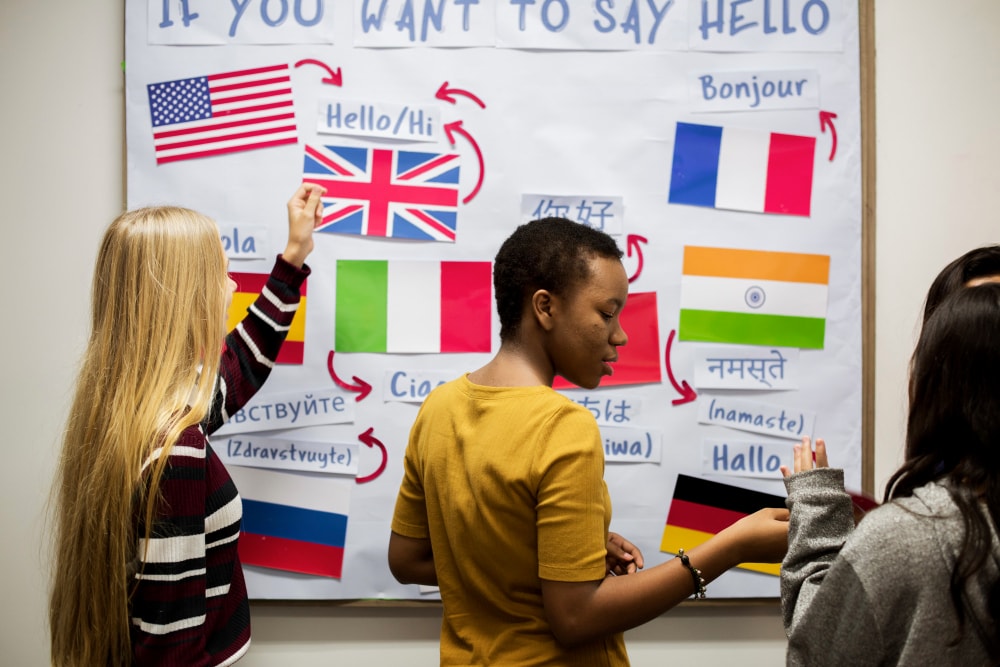Navigating Europe’s rich linguistic landscape can be a challenge for travelers and expats alike. With more than 200 languages spoken across the continent, understanding how to communicate effectively is essential for a smooth and enriching experience. Translation in Europe connects travelers and expats to the wider world, making global travel and communication seamless. This guide will help you understand the basics of translation in Europe, the importance of local language skills, and how to overcome communication barriers during your journey. The rich history of languages in Europe, shaped by significant historical events, continues to influence the continent’s diverse linguistic landscape today.
Introduction to European Languages
Europe is a mosaic of languages, with each country offering its own unique linguistic landscape. In Germany, the native language is German, and it plays a central role in daily life and culture. However, many Germans speak English, especially in cosmopolitan cities like Berlin and Munich, making it easier for foreigners to communicate and get around. Studies show that over half of Germans can speak English to some degree, which is a great advantage for travelers and expats. Still, if you want to truly immerse yourself in German culture and make the most of your experience, taking the time to learn German can be incredibly rewarding. Whether you’re navigating daily life, making new friends, or exploring the country, building your language skills will help you connect more deeply with locals and enhance your overall experience in Germany.

Germans Speak English — But Not Always
Germany is often considered one of the most accessible countries in Europe when it comes to language. While many Germans — especially in large cities — speak English to a functional level, it’s important to remember that this is not universal. In a city like Berlin, Munich, or Frankfurt, the majority of people are comfortable with English, making it easy for travelers to communicate. Most people under 40 have learned English in school, but in small towns or East Germany, the English proficiency rate can vary.
If you’re in Berlin, Munich, or Frankfurt, you’ll likely find that most locals can understand you. In these cities, most Germans speak much English, so communication is basically easy for travelers. But once you move away from the big cities, you might ask “Sprechen Sie Englisch?” and hear “Nein” more often than you’d expect.
Speak English, But Learn German
While being a native English speaker gives you a huge advantage, knowing at least a few German words will help you connect more deeply with locals. Learning German shows respect for the local culture and makes everyday interactions easier. Whether you’re trying to order food, ask for directions, or talk with German friends, a little effort goes a long way.
Enrolling in a formal course at a local school, university, or online platform is one of the most effective ways to systematically learn German. Try simple courses online, use YouTube videos, or download mobile apps to practice basic phrases. Knowing how to speak German, even at a beginner level, can turn a stressful situation into a pleasant one.

Google Translate Is Helpful — But Not Perfect
Many travelers rely on Google Translate and similar online services to bridge the language gap. To get the most out of Google Translate when traveling in Europe, consider watching a helpful video tutorial that demonstrates its features and best practices. While this tool is incredibly useful, it’s important to understand its limitations. Literal translations can often be confusing or even rude if used without context. For example, menus or documents may use idioms that don’t translate cleanly.
Still, Google Translate and other apps are essential tools — especially for reading websites, signs, and product labels. Just remember to use them with cultural sensitivity.
Many Germans Understand English, But Not All Speak Fluently
In Germany, English is widely taught in schools, and younger generations tend to have stronger English skills. In many German schools, talking in English is often emphasized to help students communicate effectively in real-life situations. However, there are different levels of fluency. Don’t assume every German is confident in English — be patient and speak clearly.
If you’re in a business meeting or a customer service situation, you’re more likely to find fluent speakers. In contrast, when dealing with locals in rural areas, you’ll encounter a broader range of comfort levels.
In Small Towns, Knowing German Is Essential
In small towns across Germany and Europe, knowing German (or the local native language) becomes increasingly important. While knowing English may be enough for short visits, those planning longer stays or permanent moves will find that learning German is essential to feel comfortable and integrated. Here, people are less likely to speak English, and services may not offer translations. This is where translation in Europe becomes more than a convenience — it’s a necessity.
Expats moving to smaller towns should consider language courses or hiring a private tutor to ease the transition. Daily life — from grocery shopping to filling out legal forms — becomes significantly easier with language proficiency.

Translation Services and Apps Across Europe
Whether you’re a traveler, expat, or company looking to expand across borders, having access to reliable translation services is key. Professional translators, bilingual locals, and language schools can help you adapt your documents, websites, and communication for each specific country.
This is especially important for businesses working across different European markets. Understanding local culture, idioms, and expectations helps enhance your brand’s reputation and build trust with customers. It is crucial to understand and comply with local laws and regulations when expanding your business in Europe. Note: Legal and cultural considerations can significantly impact your operations, so always pay attention to these aspects. Conduct thorough research into regulations, market opportunities, and competition before entering a new European market to ensure a successful expansion.
Communicating with Locals
When it comes to communicating with locals in Germany, native English speakers often find it easier than expected. Many Germans, particularly among the younger generations, speak English well and are happy to help foreigners. It’s always a good idea to start a conversation with a polite German phrase like “Sprechen Sie Englisch?” to show respect for the local language and culture. If the person you’re speaking with doesn’t speak English, they’ll often try to find someone nearby who does, or you can use Google Translate to bridge the gap. In smaller towns, English may not be as widely spoken, but many Germans are still willing to assist and make an effort to communicate. Embracing these interactions not only helps you get by but also enriches your understanding of German culture and daily life.
Language Classes and Resources
If you’re interested in learning German, there are plenty of resources to help you get started. Language schools across Germany, such as the popular Volkshochschule, offer courses for all levels, from complete beginners to advanced speakers. Online platforms, including YouTube channels, language learning apps, and dedicated websites, provide flexible options for practicing at your own pace. Many Germans are also eager to practice their English skills, so language exchanges can be a fun and effective way to improve your German while helping others with their English. With so many courses and resources available, learning German is more accessible than ever, and investing in your language skills will enhance your experience in Germany, whether you’re here for work, study, or adventure.

Cultural Differences and Etiquette
Understanding German culture and etiquette is essential for building positive relationships with locals. Germans are known for their direct and formal communication style, and punctuality is highly valued in both social and professional settings. When meeting someone for the first time, it’s customary to use formal titles and last names until you’re invited to switch to first names. Personal space and privacy are also important, so be mindful of boundaries in conversations and social situations. By respecting these cultural differences, foreigners can avoid misunderstandings and show appreciation for the local way of life. Embracing German customs and etiquette will help you connect with locals and make your time in Germany more enjoyable and rewarding.
Daily Life in Europe
Adapting to daily life in Europe, and especially in Germany, can be an exciting journey full of new experiences. From using public transportation to shopping at local markets, there’s always something to learn. Translation tools like Google Translate can be invaluable for overcoming language barriers, whether you’re reading signs, filling out forms, or chatting with locals. Many Germans are friendly and willing to help, making it easier for newcomers to settle in and feel at home. Being open to learning, asking questions, and embracing the local culture will help you navigate life in Germany with confidence. Whether you’re interested in starting a business, picking up a new language, or simply exploring what the country has to offer, Germany provides countless opportunities for growth and discovery for foreigners and expats alike.
Final Notes: Be Prepared, Be Respectful
Whether you’re moving to Germany, exploring France, or doing business across Europe, being mindful of the language landscape will improve every part of your experience. Learn the basics, use translation tools wisely, and always approach communication with a spirit of curiosity and respect.

FAQ: Understanding Translation in Europe for Travelers and Expats
Is German difficult for an English speaker to learn?
German can be challenging due to grammar and word structure, but for a native English speaker, it’s one of the easier European languages to learn. Knowing German helps with translation in Europe, improves your life in Germany, and makes it easier to make German friends.
Is English widely spoken in Germany?
Yes, many Germans—especially in large cities like Berlin, Munich, and Frankfurt—speak English well. Younger generations often have strong English skills, but in small towns and parts of East Germany, fewer people speak English fluently.
Can I survive in Germany with only English?
You can manage basic tasks in major cities using English, but learning some German language basics is highly recommended. In rural areas and for official processes, knowing German or using Google Translate can be essential.
What if I don’t speak German—can I still travel?
Yes, Google Translate and similar apps help bridge the gap. However, translation in Europe often requires context, so having some language skills makes travel smoother and less confusing—especially when reading menus, signs, or documents.
Is it hard to get an English-speaking job in Germany?
While there’s demand for English-speaking professionals in tech, marketing, and international companies, many positions require at least basic German skills. Expats with strong English and specialized skills often find jobs in major cities.
How can I improve my German language skills while living in Germany?
You can learn German through language schools, YouTube, online courses, or by practicing with locals and friends. Many expats find that everyday interactions are a great way to build fluency over time.
What services help with translation in Europe?
For travelers and expats, Google Translate, DeepL, and online language tools are helpful. For business, using professional translation services is key when dealing with customers, documents, and websites.
Is using only Google Translate enough for communication?
Not always. While Google Translate is helpful for quick needs, it may misinterpret phrases or cultural meanings. Combine it with real language learning, or ask locals politely: “Sprechen Sie Englisch?” to check if they speak English.
What are some common German phrases every expat should know?
Some basics include:
- Hallo (Hello)
- Danke (Thank you)
- Bitte (Please / You’re welcome)
- Wo ist…? (Where is…?)
- Sprechen Sie Englisch? (Do you speak English?)
Learning these can improve your customer experience, travel comfort, and day-to-day life in Germany.
Why is understanding local language and culture important in Europe?
It helps avoid misunderstandings, builds friendships, and shows respect. In business, it improves communication with customers and companies across Europe and helps you connect across cultures.

